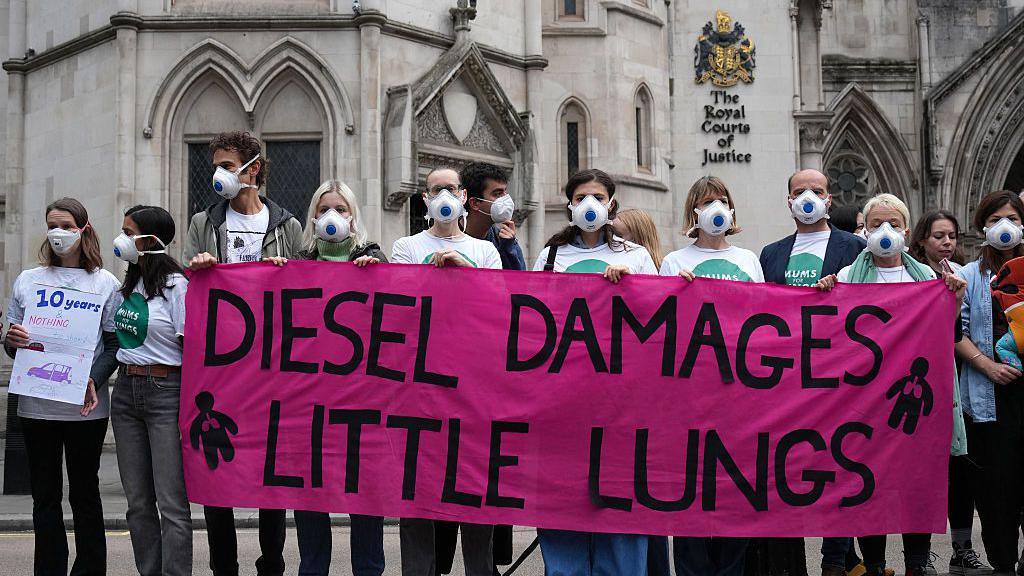“`html
A significant legal battle has commenced at the High Court in London, with a major lawsuit leveled against five prominent car manufacturers accused of manipulating emissions tests.
This trial marks the latest development in the ongoing “dieselgate” scandal, as the companies face serious allegations of employing illicit software designed to reduce harmful gas emissions from their vehicles specifically during testing scenarios.
During Monday’s proceedings, the court heard claims that the car manufacturers prioritized “cheating over compliance” when it came to adhering to vehicle emission regulations.
The carmakers in question – Mercedes, Ford, Peugeot/Citroën, Renault, and Nissan – have collectively denied all accusations.
Thomas De La Mare KC, representing the car owners, stated during the trial’s opening that “each player in the industry basically took a conscious decision that customer convenience, which helped the industry sell more cars, was more important” than preventing pollution.
In his written submissions, Mr. De La Mare referenced a report by the Centre for Research on Energy and Clean Air, which concluded that excessive nitrogen oxide emissions from diesel engines contributed to 124,000 premature deaths and 98,000 new cases of asthma in children across the UK and Europe between 2009 and 2024.
However, Alexander Antelme KC, representing Renault, argued in his written submissions that the allegations of emissions test cheating were “without merit and untenable.”
He wrote, “The features to which the claimants wrongly object are, in fact, appropriate and necessary elements of a well-designed diesel engine.”
Neil Moody KC, representing Ford, characterized the case as “scientifically illiterate” and “flawed on the facts and the law” in his written submissions.
“The inference seems to be of some sort of industry-wide conspiracy. The proposition need only be stated for it to be seen to be implausible.”
The dieselgate scandal initially surfaced in September 2015 when the US Environmental Protection Agency accused Volkswagen of installing “defeat devices” – software designed to manipulate nitrogen oxide emission readings in diesel vehicles.
This software could detect when vehicles were undergoing official emissions testing and would activate systems to reduce nitrogen dioxide output, a gas known to cause respiratory issues.
However, during regular on-road use, these systems were deactivated to enhance performance, resulting in significantly higher pollution levels than indicated by official figures.
Volkswagen later admitted to deliberately using defeat devices to circumvent emissions tests in the US and acknowledged that approximately 11 million vehicles worldwide were fitted with the software. The company ultimately paid around £26 billion in fines and compensation.
Legal experts have described the current case as the largest class action in English and Welsh legal history, potentially involving 1.6 million car owners.
The five companies involved were selected by the court as lead defendants for the initial trial due to the case’s magnitude. They are accused by 880,000 car owners of providing misleading information regarding emissions tests.
Depending on the outcome of this trial, nine other carmakers may face similar claims.
In 2020, the High Court ruled that Volkswagen had indeed used defeat devices, violating European Union regulations designed to ensure accurate emissions testing.
Volkswagen subsequently settled a class action out of court, providing £193 million in compensation to 91,000 British motorists.
To date, the company has paid out over €32 billion (£27.8 billion) in connection with the scandal, primarily in the United States.
Outside the High Court on Monday, members of the campaign group Mums for Lungs and Rosamund Adoo-Kissi-Debrah, whose daughter Ella was the first person in the UK to have air pollution listed as a cause of death, were present.
A judgement on the High Court case is not expected until summer 2026.
The companies involved have maintained that the claims against them are without merit.
A Mercedes spokesperson stated that the mechanisms used in tests were “justifiable from a technical and legal standpoint.”
Renault and Stellantis, the owner of Peugeot and Citroen, asserted that the vehicles they sold were compliant with regulations at the time of sale.
Ford stated that the claims had “no merit,” and Nissan affirmed its “commitment to compliance in all markets in which we operate.”
The main trial before Lady Justice Cockerill is scheduled to conclude in December, but legal arguments will not be heard until March 2026.
Sign up for our Future Earth newsletter to get exclusive insight on the latest climate and environment news from the BBC’s Climate Editor Justin Rowlatt, delivered to your inbox every week. Outside the UK? Sign up to our international newsletter here.
The bank has set aside an additional £800m, saying the number of eligible claims is expected to be higher than previously thought.
The Advanced Technology and Automotive Centre in Bilston aims to tackle unemployment in the region.
The association of the luxury car makers with the town of Newport Pagnell has been celebrated.
Workers return to West Midlands and Merseyside factories in a “significant moment” for the company.
Millions could be entitled to compensation as a result of commission arrangements between lenders and dealers.
“`

